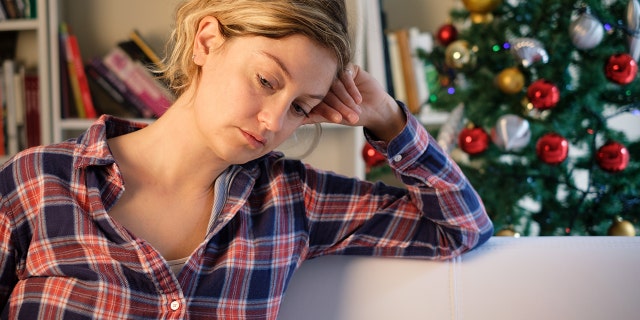The holidays looked different for Americans this year, with traditions altered or scrapped altogether due to coronavirus, and health officials urged families to opt for virtual or small gatherings rather than the large celebrations many have grown accustomed to. To cope, some turned to decorating houses or driving around the see festive lights. But when the season is over and the décor goes away, will the temporary distractions give way to the post-holiday blues?
“Due to social gathering concerns and restrictions, we may experience more stress and sadness due to the inability to gather with family and friends as we would have in prior years,” Dr. Desreen N. Dudley, PsyD, a licensed clinical psychologist who works as a behavioral health quality consultant for Teladoc, told Fox News. “Holidays tend to trigger an increase in depressive and anxiety symptoms for those who struggle with mental health. Triggers include a reminder of loss or absences of loved ones – and it increases sadness. The pandemic and being physically distant from close family and friends during the holiday season have created stress for all of us, regardless of pre-existing mental health issues.”
Post-holiday blues are not a new phenomenon or a byproduct of the coronavirus, but due to ongoing stress or feelings of isolation, it’s possible that some may be experiencing it for the first time.
CHRISTMAS TREES: WHEN AND HOW SHOULD YOU THROW THEM OUT
“Post-holiday blues are negative mood changes that set in after the common buildup of intense and high emotion and activity of shopping, planning and overall excitement of the holidays,” Dudley said. “What happens is we come down from high emotion, and then must re-adjust to return to life as usual. This may include returning to home work, or the departure of guests or loved ones from one’s home.”
The signs can mimic symptoms of anxiety or depressive disorders like sadness, low energy, difficulty concentrating and focusing, low motivation, difficulty sleeping, irritability, worry and stress. It can set in any time there is a drastic change from normal life, and no one group is exempt, Dudley said.

Anyone can be at-risk for post-holiday blues, one expert said.
(iStock)
“Anyone can be at risk for post-holiday blues,” Dudley said. “Children, like adults, are prone to experiencing this, as well.”
Parental stress, returning to school, missing family members or loved ones, and sadness about gifts not received are all potential triggers for post-holiday blues in children, she said. Planning post-holiday activities or something to look forward to can help alleviate these feelings and allow for a smoother transition back to a normal routine for both children and adults.
IS CORONAVIRUS COMPOUNDING YOUR HOLIDAY STRESS? EXPERTS LEND ADVICE
Getting back into a healthy routine, or taking some time off of work instead of jumping right back in can also help, Dudley advises, as well as staying within a budget while holiday shopping to avoid any lingering financial stress.
Typically, post-holiday blues will go away after you’ve readjusted to life as usual, whereas depression represents a more permanent feeling of low, Dudley said.
If the feelings do become overwhelming, utilizing a telehealth service to talk to a mental health professional can help. Volunteering and staying connected with loved ones can also help to avoid feelings of isolation which can exacerbate feelings of depression, as can excessive consumption of news and social media.
CLICK HERE FOR COMPLETE CORONAVIRUS COVERAGE
“If you are wondering if you should seek help, that’s a sign that you should,” Dudley said. “It’s never a wrong time to seek treatment to take care of your mental health.”
It’s also important to watch for signs of post-holiday blues in family and loved ones.

